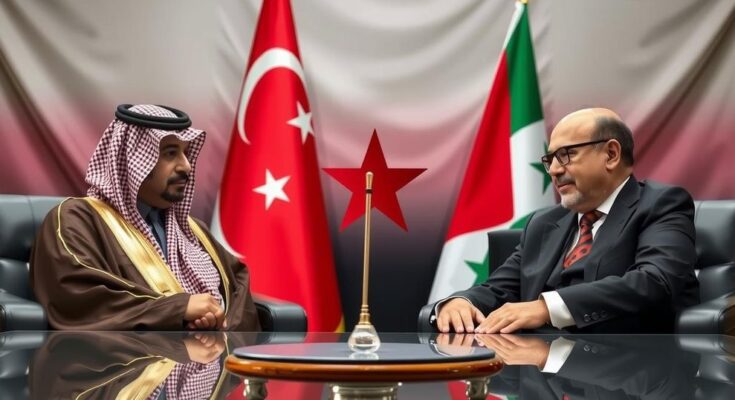Qatar and Jordan have pledged support to Syria, with Qatar ready to invest in the nation’s energy sector and ports, while Jordan focuses on reconstruction efforts. The meetings with Syrian leader Ahmed al-Sharaa highlight a realignment of Arab diplomatic relations following the departure of Bashar al-Assad. Both nations emphasize the importance of cooperation on security issues, including smuggling and the threat from the Islamic State.
Qatar and Jordan have pledged their support to Syria following a significant shift in the country’s leadership. In a recent meeting in Damascus, Ahmed al-Sharaa, the de facto Syrian leader following the overthrow of Bashar al-Assad, discussed possible investments in Syria’s energy sector and ports with Qatar’s Minister of State for Foreign Affairs, Mohammed Al-Khulaifi. During this meeting, Sharaa also welcomed Jordanian Foreign Minister Ayman al-Safadi, who expressed Jordan’s readiness to assist in Syria’s reconstruction efforts and cooperation to address cross-border issues.
These developments signal the beginning of a new diplomatic landscape for Syria after the departure of Assad, as both Qatar and Jordan aim to strengthen ties with the new administration. Sharaa emphasized the necessity of broad investments in various sectors, particularly energy, indicating that Qatar possesses valuable expertise to contribute. Additionally, there was a strong focus on addressing security concerns related to drug and weapon smuggling, as well as the threat posed by the Islamic State.
The geopolitical landscape of the Middle East has become increasingly complex due to the changes in Syrian leadership. Qatar’s intention to invest heavily in Syria highlights the potential for economic recovery and growth, while Jordan’s involvement indicates regional support for stability and security in its neighboring country. Both nations are motivated by the pressing need to stabilize the region and offer humanitarian assistance following years of conflict.
Finally, discussions have raised hopes for a reinvigorated relationship between Syria and its Arab neighbors, signaling a collective desire to foster cooperation and development in the aftermath of a protracted civil war. Sharaa’s commitment to reconstruction and economic development, combined with Qatar and Jordan’s pledges of support, forms a foundational step towards restoring Syria’s position within the Arab community.
Recent geopolitical shifts following the overthrow of Bashar al-Assad have allowed Qatar and Jordan to engage with the new Syrian administration led by Ahmed al-Sharaa. The meeting marks a crucial moment in Arab diplomacy, as both nations seek to provide support and establish relations amidst ongoing regional instability. Sharaa’s administration represents a departure from Assad’s rule, allowing for a potential realignment of alliances and investments in crucial sectors, such as energy. The involvement of both Qatar and Jordan signifies a renewed commitment to stability, security, and reconstruction in Syria.
In conclusion, the pledges of support from Qatar and Jordan represent significant steps towards Syria’s reconstruction and regional diplomatic re-engagement following years of conflict. With a focus on investment in the energy sector and security cooperation, these developments underscore the urgency of addressing Syria’s humanitarian and economic needs while fostering stability in the region. The continuation of diplomatic contacts bodes well for the potential recovery of Syria under the newfound leadership of Ahmed al-Sharaa, as he seeks to navigate the complex political landscape.
Original Source: www.channelnewsasia.com




